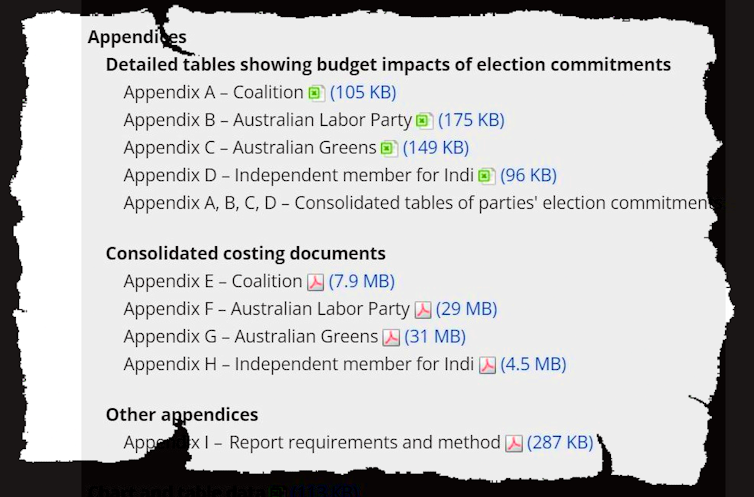Election promises should be costed before polling day, otherwise it's too late
- Written by Stephen Bartos, Professor of Economics, University of Canberra

Wouldn’t you know it? Last Thursday the Parliamentary Budget Office released more than 1,000 pages of costings, for promises in the election we just had.
They came in 16 parts, each separately downloadable, along with a video message, charts and tables, explanations, and summaries.
It was a lot of work, but it was too late to have an impact. We’d already voted.
The report was covered briefly by the Canberra Times, a couple of regional papers, and online site Crikey. It garnered close to zero attention.
In its wake, the shadow treasurer Angus Taylor issued a media release attacking Labor for increasing the projected budget deficit.
But that too was old news. During the campaign, Labor had said that’s what it would do.
The ratio of attention paid to the number of pages produced was dismal.
The letter of the law
This isn’t the fault of the Parliamentary Budget Office. It is required by law to release the report 30 days after the election. It doesn’t have the power to compel the parties to submit lists of their policies for analysis until 5pm on election eve.
Getting even that power was a close-run thing. Treasurer Wayne Swan added the requirement to the legislation in a 2013 amendment.
Trouble is, it is hard to discern from the public record why he did it. The explanatory memorandum and speeches assert it will be good for transparency and accountability but do not explain how.
Definitionally, to the extent there is more detailed information, there is greater transparency. But if the information is delivered after people have voted, it’s worth asking how it could improve accountability.
Data should be useful
It can’t be taken for granted that more data equals more accountability. Data needs to be used for something – to spark debate, or inform votes.
NSW had a Parliamentary Budget Office before the Commonwealth, which means the amendment might have been based on a NSW requirement for major parties to give the NSW office a list of their policies.
But the difference is that in NSW the report is published five days before the election. There’s a chance it can swing votes.
Read more: Elections used to be about costings. Here's what changed
Publishing it after the election, as the Commonwealth office does, means it is almost guaranteed to be ignored.
Does anyone really care what the costs were for the party that lost? Or those for the Greens or even the Member for Indi, who wasn’t required to take part but in 2022 did so voluntarily?
The information about the party that won might be useful, but it will soon be overtaken by the October budget which will provide updated costings.





